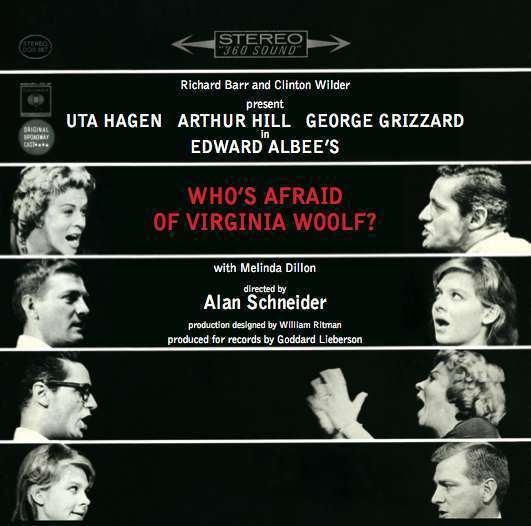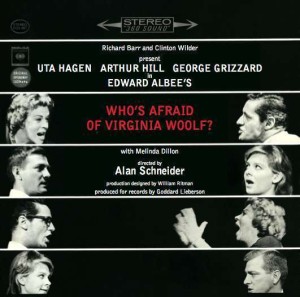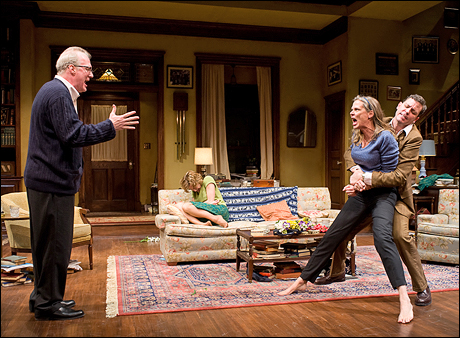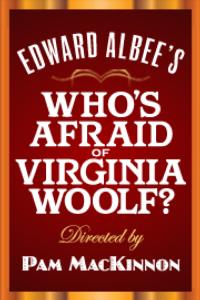Bertie Carvel – Matilda. Hearing Carvel’s performance on the original cast recording was my main impetus in making sure I got to London to see the show while he was still in the cast. As Agatha Trunchbull, the grotesque headmistress at war with Matilda Wormwood, Carvel creates one of the great comic villains in music theatre, a domineering physical presence whose second act anti-child number “The Smell of Rebellion” is a show-stopper. There are panto elements in the performance, but he plays Miss Trunchbull without winking or leering, showing shades of the insecure bully who resorts to all sorts of nasty business. I’m so thrilled NY will have a chance to see his performance in the upcoming Broadway transfer.
James Corden – One Man, Two Guvnors. The most brilliant comic creation I’ve seen since Mark Rylance took Broadway by storm with Boeing Boeing, Corden’s Francis Henshall – portly, silly, lovable – was a delight from start to finish. It’s rare that pure silliness can beget pure joy. Corden managed to do this through the mix of high and low (mostly low) brow humor in Richard Bean’s updating of A Servant of Two Masters. I saw the show a total of three times, including opening night and the utter free-for-all that was the closing night (hijinks, pranks, nudity, and all sorts of glorious hijinks in the spirit of the show) and I consistently laughed until my sides ached every time. Much of this is due to Corden’s brilliance. I do wish the play had continued after his scheduled departure, but fortunately it’s still running in London for those who want some breathless hilarity.
Linda Lavin – The Lyons. Lavin gave up supporting roles in Broadway transfers of Follies and Other Desert Cities to play this leading role off-Broadway, and with good reason. Rita Lyon is one of the most fascinating mothers in American drama since Violet Weston went nuts on her family. Lavin was able to turn a magazine page turn into a comic gold mine, and constantly surprised. Her exit speech was so brilliantly delivered that she received two back to back showstopping ovations.
Tracy Letts – Who’s Afraid of Virginia Woolf? Albee’s play is one of my favorites and I would gladly see any production of it anywhere. This Steppenwolf import is an intense, visceral experience that makes the battle for the upper-hand one of the games along the way. Intense work by a superb ensemble, but Letts comes out on top in this reimagined look at the fascinating George. He is terrifying, hilarious, charming, dangerous and unsettling making a role seem new. Everyone else in the ensemble is the better for this searing portrayal. A must-see performance.
Donna Murphy – Into the Woods. Critics were mixed on this production (and having seen it three times throughout its run, I think it was a mistake to let them in early), but Murphy’s portrayal of the Witch was one of the most galvanizing performances I have ever seen. Playing up the character’s pragmatism and relationship to Rapunzel, it was as though I understood a maternal need for the character that either I missed before, or just wasn’t present in other performances I have seen. Her “Last Midnight” was nothing short of legendary; one of then most terrifying and devastating showstoppers of the year.
Imelda Staunton – Sweeney Todd. I made it a point to catch this highly-acclaimed revival while in London, and I am so glad that I did. Michael Ball was Sweeney Todd, and while he was better than I expected, it was Imelda Staunton’s searing, gritty portrayal of the enterprising, conniving Mrs. Lovett that I left thinking about. Practically every facet of her performance is seared in my memory – from her reaction to Pirelli’s dead body, to the chilling look out front while James McConville finished singing “Not While I’m Around,” to the spectacular work she did in the show’s searing final scene. Apparently Ms. Staunton is uninterested in a Broadway transfer, and that is truly New York theatre’s loss.
Katie Thompson – Giant. There was much to admire in the Public Theater’s presentation of Michael John La Chiusa’s Giant, including the winning lead performances of Brian d’Arcy James and Kate Baldwin, but as Vashti Hake, the jilted cowgirl heiress turned tycoon’s wife, Katie Thompson took me completely by surprise. Ms. Thompson got two of the best songs in the show,”He Wanted a Girl” and “Midnight Blues” and delivered a featured performance so striking I want to see her star in her own musical.
Anthony Warlow – Annie. This Australian powerhouse made his Broadway debut as Daddy Warbucks the current revival, recreating a role he has played several times before. Much to my surprise, Mr. Warlow managed to steal this classic musical about that orphan from both of its leading ladies, with his gruff but sincere demeanor and a voice that is nothing short of spectacular. His rendition of “Something Was Missing” brought down the house, something I wouldn’t have thought previously. He is the heart and soul of this uneven, but entertaining production.
Eleanor Worthington-Cox – Matilda. In the past year I have seen an inordinate amount of child performances. In the past I haven’t taken too well to kids on stage – not unlike the stage manager in Gypsy – but for the most part I saw real children giving strong performances that weren’t overly precocious or cloying. And while I was in London, I so loved Matilda that I saw it twice. While the Matilda I covered was the exceptional Sophia Kiely, I think Eleanor Worthington-Cox gave the greatest child performance I have ever seen in my life. (With all respect to Ms. Kiely, who was superb). It felt like I was watching the perfect embodiment of Dahl’s character.
In a category all its own was the sublime reunion concert of Assassins, which brought back almost the entire 2004 cast at Studio 54. A sterling ensemble, it’s a shame they couldn’t have a revival of the revival as they are all still so extraordinary.
Also worth mentioning: Victoria Clark and Christopher Fitzgerald who both walked away with the Collegiate Chorale’s concert presentation of The Mikado. Clark entered like a virago, stopping the show before she even opened her mouth. She and Fitzgerald created pandemonium with their eleven o’clock performance of “There is Beauty in the Bellow of the Blast.”








